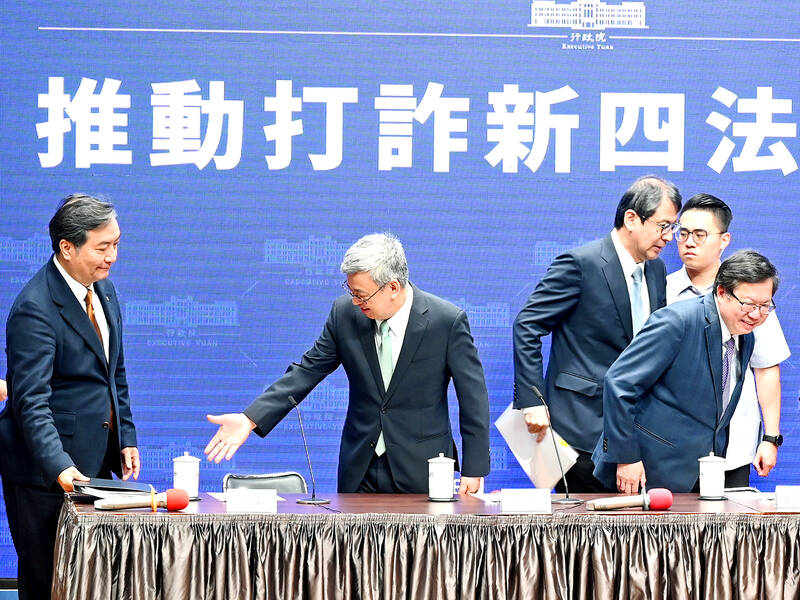The Executive Yuan yesterday approved a slew of bills targeting fraud by raising the penalty for convicted scammers, increasing police surveillance powers and compelling social media platforms to remove scam advertisements.
The bills aim to build a legal framework to aid the government’s fight against fraud, Premier Chen Chien-jen (陳建仁) told a news conference in Taipei also attended by Vice Premier Cheng Wen-tsan (鄭文燦), Minister Without Portfolio Lo Ping-cheng (羅秉成), Ministry of Justice representative Kuo Yung-fa (郭永發) and Minister of Digital Affairs Audrey Tang (唐鳳) after an Executive Yuan meeting.
A proposed anti-fraud bill would define severe fraud as actions that cost victims NT$10 million (US$308,071) or more in losses, the officials said.

Photo: Wang Yi-sung, Taipei Times
Severe fraud would be punishable by a sentence of three to 10 years and a fine of up to NT$30 million, they said.
A 50 percent sentencing enhancement would be applied to main offenders if the crime involved three or more co-conspirators, impersonation of government officials or use of deepfake technology, they said.
Repeat offenders would be subject to harsher sentences for each new conviction and lose the possibility of parole on their third jail sentence for committing severe fraud, they said.
The punishment could be lessened or remitted if the offender surrenders before the crime is discovered and returns all ill-gotten gains, the officials said.
Cooperation with authorities resulting in the main offender’s identification could also reduce or remit the penalty, they added.
A separate technological surveillance and protection draft act would empower police to use snooping devices, they said.
Police surveillance is to be governed by increasingly strict scrutiny with privacy violation and power abuse concerns in mind, officials said.
The bill defines conditions in which the use of surveillance devices is acceptable, they said, adding that previous rules governing the destruction of data obtained by snooping still apply.
Authorization of the use of GPS trackers, fake cell towers and thermal imagers or other devices capable of surveillance without physical intrusion would be subject to the least, intermediate and highest levels of scrutiny respectively, they said.
The bundle of bills included amendments requiring foreign-based social media platforms to register and have a legal representative in Taiwan to ensure compliance with measures targeting advertisements for scams, officials said.
Platforms that operate without a legal representative or do not comply with government orders to remove an ad would be subject to a fine of NT$2.5 million to NT$25 million, they said.
Severe breaches of the act could lead to other sanctions, including bandwidth limits and being blocked from the Internet in Taiwan, they said.
The standards for applying the proposed legislation on platforms are to be established administratively and would likely encompass Facebook, TikTok and Google, Tang said.

SECURITY: As China is ‘reshaping’ Hong Kong’s population, Taiwan must raise the eligibility threshold for applications from Hong Kongers, Chiu Chui-cheng said When Hong Kong and Macau citizens apply for residency in Taiwan, it would be under a new category that includes a “national security observation period,” Mainland Affairs Council (MAC) Minister Chiu Chui-cheng (邱垂正) said yesterday. President William Lai (賴清德) on March 13 announced 17 strategies to counter China’s aggression toward Taiwan, including incorporating national security considerations into the review process for residency applications from Hong Kong and Macau citizens. The situation in Hong Kong is constantly changing, Chiu said to media yesterday on the sidelines of the Taipei Technology Run hosted by the Taipei Neihu Technology Park Development Association. With

A US Marine Corps regiment equipped with Naval Strike Missiles (NSM) is set to participate in the upcoming Balikatan 25 exercise in the Luzon Strait, marking the system’s first-ever deployment in the Philippines. US and Philippine officials have separately confirmed that the Navy Marine Expeditionary Ship Interdiction System (NMESIS) — the mobile launch platform for the Naval Strike Missile — would take part in the joint exercise. The missiles are being deployed to “a strategic first island chain chokepoint” in the waters between Taiwan proper and the Philippines, US-based Naval News reported. “The Luzon Strait and Bashi Channel represent a critical access

CARROT AND STICK: While unrelenting in its military threats, China attracted nearly 40,000 Taiwanese to over 400 business events last year Nearly 40,000 Taiwanese last year joined industry events in China, such as conferences and trade fairs, supported by the Chinese government, a study showed yesterday, as Beijing ramps up a charm offensive toward Taipei alongside military pressure. China has long taken a carrot-and-stick approach to Taiwan, threatening it with the prospect of military action while reaching out to those it believes are amenable to Beijing’s point of view. Taiwanese security officials are wary of what they see as Beijing’s influence campaigns to sway public opinion after Taipei and Beijing gradually resumed travel links halted by the COVID-19 pandemic, but the scale of

Pope Francis is be laid to rest on Saturday after lying in state for three days in St Peter’s Basilica, where the faithful are expected to flock to pay their respects to history’s first Latin American pontiff. The cardinals met yesterday in the Vatican’s synod hall to chart the next steps before a conclave begins to choose Francis’ successor, as condolences poured in from around the world. According to current norms, the conclave must begin between May 5 and 10. The cardinals set the funeral for Saturday at 10am in St Peter’s Square, to be celebrated by the dean of the College